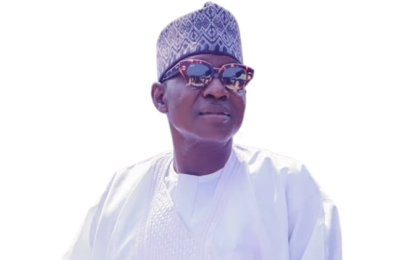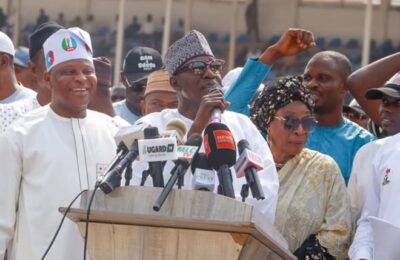There exists a timeworn Igala axiom, “a maiden cannot conceal scars with cosmetics.” No idiom could more accurately embody the contemporary affliction that festers within Kogi East. The political landscape of our once-glorious province has degenerated into a hollow theatre of cosmetics—where appearances have eclipsed authenticity, and ornamental governance has replaced organic progress.
We, the Igala people, are now locked in a grotesque masquerade of collective self-deceit. We clap at shadows. We bow before caricatures in agbada. We proclaim peace when the drumbeat of political emasculation reverberates through our bones. And worse still, we smile through the pain. Even now, we pretend that all is well—even when our socio-political anatomy has been ravaged. Humiliated, not just by our own folly, but by the audacity of younger political gladiators from Okene, whose strategic prowess has landed a venomous bite right into our proverbial scrotum—leaving us subdued and ashamed, yet too dignified to scream.
This biting humiliation is not merely political—it is spiritual, historical, and generational. It is the culmination of years of self-inflicted regression, institutional indolence, and generational betrayal by those who should have acted as custodians of vision. Our leadership has mutated from a sacred mantle of sacrifice into a clownish parade of powdered faces, silk fabrics, and social media theatrics. Where the thrones of our fathers once thundered with justice, wisdom, and foresight, we now have empty chairs occupied by men intoxicated with self-adulation and applause addiction.
Yet, there was a time when being called a leader in Igala land meant stepping into the crucible of courage. We need not look far for illustration. The name Ocholi Oga Akor still echoes through the ancestral corridors of our collective memory. He was not merely a warrior—he was warfare personified. In an epoch defined by territorial invasions and existential threats, Ocholi was chosen by the elders—not for his eloquence or charisma—but for his indomitable spirit. “Oga Akor ma’ d’omuja”—the one selected for the ferocious confrontation.
In the heat of battle, a venom-laced arrow struck his finger—a death sentence in ancient warfare. But Ocholi did not flinch. With clinical precision and unfaltering resolve, he unsheathed his own sword, severed the infected finger, raised his bleeding hand toward the heavens and declared, “Let the battle begin!” That singular act was more than survival—it was symbolism. A covenant of leadership etched in blood: that duty must always outweigh discomfort, and that a true leader must amputate what threatens the body for the preservation of the body politic.
Contrast this with today’s political “warriors” in Kogi East, who treat criticism as poison, questions as hostility, and town hall meetings as unnecessary rituals. Their only warfare is against transparency. They hold microphones like sceptres and organize “empowerment programs” where more photographers are present than actual beneficiaries. They inherit Ocholi’s name, but not his nerve; his robes, but not his resolve.
Our politics has become performance art. From Idah to Ofu, from Ankpa to Lokoja, governance has been trivialized into a sequence of staged funerals, stylized empowerment ceremonies, and fraudulent thanksgiving services. Political actors are now influencers. Community development has become content creation. Statecraft is now styled after Instagram reels, and political campaigns are TikTok choreography—tragically void of vision, direction, or substance.
But even more damning than the politicians are the people who prop them up. We, the constituents, have become enablers of mediocrity, trading our sovereign power for 100 naira palliatives, our dignity for diesel, our destiny for branded wrappers and sachet rice. We have institutionalized sycophancy and crowned ineptitude. “the boy that follows the dancing masquerade forgets the meat boiling behind the hut.” We have followed the masquerade too long, and now the meat is burnt. Our inheritance has evaporated while we applauded theatrics.
And yet, the ancestors are not silent. The spirit of HRM Ayegba Om’Idoko broods over the land, mournful and restless. This was a king who offered his own daughter—Princess Inikpi—as a human sacrifice to protect the Igala nation. That singular act inscribed his name into the spiritual bedrock of Igala history, not as a ruler but as a redeemer. Today, those who seat in luggard house or wear crowns in his lineage can barely offer time, let alone their blood. They fly to Dubai while their constituents bathe in rivers. They hire bloggers instead of building bridges. They wine and dine in Asokoro, while pregnant women in Abejukolo die en route to nonexistent clinics.
We are living in the aftermath of betrayal. The spiritual venom is spreading.
But unlike Ocholi Oga Akor, our leaders refuse to cut off the poisoned limbs. They are letting the toxin of deceit, greed, and incompetence seep into the bones of Kogi East. And while the people stagger under the weight of hunger, insecurity, and institutional neglect, the elite class is busy rehearsing their next media stunt—like clowns painting over a crumbling theatre.
As wiseman once proclaimed, “When appearance becomes your master, performance becomes your enemy.” And that is precisely the dilemma we now face. Our leaders are married to appearance and estranged from performance. Our political ecosystem is a marriage of optics and opulence, with integrity locked outside the gate.
But there is still a remnant. Across the spiritual skyline of Kogi East, voices are rising. Prophetic utterances are being rekindled. Some among us still remember that leadership is a calling, not a costume. There are youths who cry out in secret for a revival. There are elders who mourn not just the loss of power but the decay of principle. There are communities now whispering again: “Igala ch’oma Ogwu or ete”—the Igala has lineage. But a true son of the true son of the soil must come clean.
And that progress will not come from powdered politicians.
It will come from men and women who are willing to bleed again—who are willing to be misunderstood, persecuted, even crucified—so that truth can stand. Leaders who will cut off the venomous fingers of tribalism, corruption, and spiritual hypocrisy, and declare with conviction: Let the battle begin.
What we face is not just political erosion; it is spiritual warfare masquerading as democracy.
Kogi East must rise again—not with face powder, but with firepower. Not with banquets, but with burdens. Not with lies, but with legacy.
And when the masquerade ends, may history remember who danced—and who bled.
May it be said of our generation: They washed off the makeup, picked up the mantle, and revived the soul of Igala land.
– Inah Boniface Ocholi writes from Ayah – Igalamela/Odolu LGA, Kogi state.
08152094428 (SMS Only)




